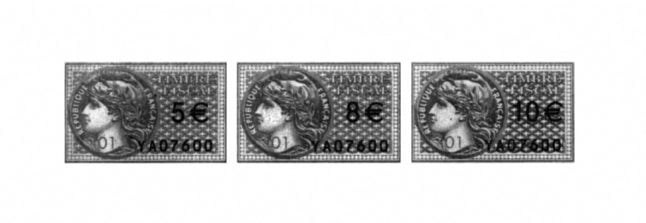In France, you can buy a very particular kind of stamp to cover the cost of a titre de séjour, or French passport, to pay your taxes, get an ID card if you’re eligible, or pay for your driving licence.
Basically a timbre fiscal is a way of paying a fee to the government, and some online processes – such as the tax offices – now have the more modern method of a bank transfer or card payment.
However there are plenty of official tasks that still demand a timbre fiscal.
In the pre-internet days, this was a way of sending money safely and securely to the government and involved an actual physical stamp – you bought stamps to the value of the money you owned, stuck them onto a card and posted them to government office.
They could be used for anything from paying your taxes to fees for administrative processes like getting a new passport or residency card.
These days the stamps are digital. You will receive, instead, either a pdf document with a QR code that can be scanned from a phone or tablet, or an SMS with a unique 16-digit figure. Both will be accepted by the agency you are dealing with.
Once you have the code you need, you can add this to any online process that requires timbre fiscaux (the plural) and that will complete your dossier.
You can buy them from a properly equipped tabac, at your nearest trésorerie, or online.
Paper stamps remain available in France’s overseas départements, but have been gradually phased out in mainland France.
What are the most common times foreigners would need a timbre fiscal?
For non-French citizens, you would need a timbre fiscal if you lose your driver’s licence or if it is stolen. Keep in mind, the original issuing of the document requires a separate administrative procedure.
READ MORE: Reader question: Do I have to swap my driving licence in France?
If you want to get a boating licence, you will also need a timbre fiscal.
When welcoming visitors from outside the EU, you will need to request an ‘attestation d’accueil‘, which involves purchasing a timbre fiscal.
Families with minor children who do not have their own residency cards often need to a DCEM to travel outside of the Schengen zone. The DCEM is not required for travel, but it can make things easier – especially for older children travelling on their own. It will also involve purchasing a timbre fiscal for the administrative process, however.
There are several residency related administrative procedures where you would need one, such as requesting a long-stay visa (VLS-TS), requesting any type of residency permit or card (carte de séjour/ résident), applying for French nationality, and (for refugees and stateless persons) when applying for travel documents.
Finally, if you want to appeal a court decision, then you will need to file your documents and pay for a timbre fiscal as well.
In terms of cost, the price is fixed at €225 for the general issuing of a residency permit (titre or carte de séjour). Similarly, when appealing against a court decision, the cost is also fixed at €225.
Otherwise, cost varies based on the situation.



 Please whitelist us to continue reading.
Please whitelist us to continue reading.
Member comments